Driving Dreams

When Ford wanted innovative ideas for the future of transportation, they reached out to Carnegie Mellon University's School of Design. What they got was moving.
"At Ford, we're inspired by our work with universities and students around the country. Carnegie Mellon has some of the nation’s brightest minds in science, technology and design, and working with the students there to explore the future of mobility opened our eyes to innovative ideas," said Wesley Johnson (A'12) a human machine interface designer at Ford.
Ford sponsored the course "Prototyping Tools for Embodying UX design," which was taught by Wayne Chung, an associate professor and Industrial Design Program chair. The course has been offered for several years with companies such as LG Electronics and BNY Mellon serving as clients.
Chung said the course allows students to tackle an open-ended, complex problem and focus on it for an entire semester using design research, visual methods and communication tools.
Although each of the projects started with the theme of "the future of mobility," each group arrived at different concepts to address system designs, service designs, sharing economies and other business and societal challenges.
"The School of Design has always been the place to make ideas tangible and imagine realities beyond the current state," Chung said.
Among the concepts created were futuristic mobility solutions for more convenient shopping and an innovative school bus experience for children.
"Create the right mixture of students from various disciplines and backgrounds, and it results in unique solutions that could not be realized without these conditions," Chung said. "We are very fortunate to have a culture of collaboration among CMU students and programs. Everyone understands there is power and potential when interdisciplinary action is enabled."
One team conceptualized the idea of an easier way to pack moving boxes. Heidi Yang (CS'15, TPR'14), Junho Lee (A'15) and Jennifer Kang (A'15) visualized a system that used a scanner and tags to allow users to create a real-time inventory list. An electronic floor plan would then allow each box to be assigned a destination in the new home so movers can deliver them to the exact spot.
Yang received her bachelor's degree from the Tepper School of Business and is working on a master's degree from the Human-Computer Interaction Institute.
"I came to CMU because it was a good place to understand art, design and technology at the same time," Yang said. "Tepper and the HCII program are the perfect combination for my passion."
She said that Ford encouraged them to push the boundaries of their ideas.
"It was an incredible experience," said Yang, who plans to pursue a interaction and product design.
Related: